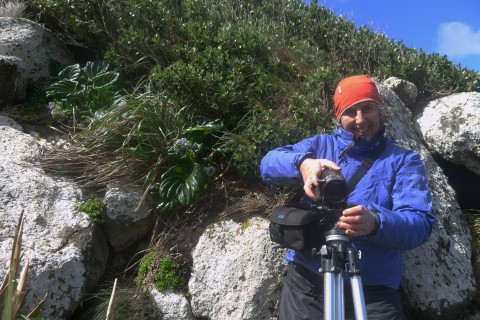Chatham Islands Adventure: Netting our unsung ocean wanderers
Our sooty shearwaters, or titi make one of the longest migrations on the planet and I was enlisted to stand on a windy cliff-top, arms outstretched in a hope of netting them (and their data loggers) so we have a fuller understanding of their flight path.
 Eighteen months ago, DOC scientist, Graeme Taylor, had put 11 loggers on various titi and our four person team was to spend the next 10 days laying in wait until the moment of capture, when we’d be graced by the stunning dawn spectacle of 200 titi streaming past us.
Eighteen months ago, DOC scientist, Graeme Taylor, had put 11 loggers on various titi and our four person team was to spend the next 10 days laying in wait until the moment of capture, when we’d be graced by the stunning dawn spectacle of 200 titi streaming past us.
The location of our adventure was a pest free island rock-stack off the coast of the Chatham’s mainland: Rangatira island.
Titi, (Puffinus griseus), not only have one of the longest migrations of any species on the planet, they are one of the deepest divers, regularly diving down 60-90m in search of food.
As we checked their legs for bands and data loggers, we quickly discovered that they’re strong and stroppy. Our hands quickly became covered in scratches, as titi’s strong bills and claws penetrated our gloves
Rangatira’s night life is raucous, there are thousands of White faced storm petrels, Titi, broad-billed prions, diving petrels, as well as growling little blue penguins that all build to a tremendously loud dawn chorus as they prepare to depart for the day. Missing at this time of year were the Chatham petrels, (Pterodroma axillaris).
They will come back to take up their burrows, provided they haven’t been taken over by a Broad billed prion, in November. Chatham petrels, like the more famous Black robin have been brought back from the edge of extinction, thanks to a dedicated team of DOC scientists and experts and volunteers. Rangatira is predator free and though once farmed is now chockka with endemic birds and plants.
The Chatham Island forget-me-not, (Myosotidium hortensium) was flowering profusely, in one place so densely that you dared not walk amongst them. My visit to Rangatira showed me what our wild places could be like if we can make New Zealand predator free.
>>>If you go out at night on Rangatira Island, you will be in danger of being caressed by the fluttering wings of hundreds of white faced storm petrels and deafened by the cackling of titi as they admonish their mates to get up and get going. (See the short video clip).


